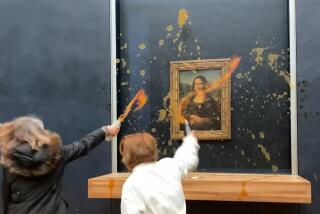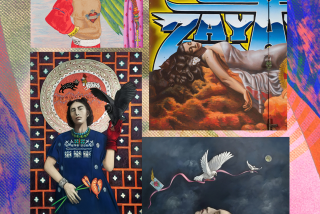Arts Plans Fall Victim to China Crisis
- Share via
UCLA professor Jim Bassler was in the midst of renewing his visa, writing lectures and preparing to host what he describes as “the first contemporary expression of Western art to be exhibited in China” when he was advised by the U.S. Information Agency to hold off on his trip.
“I was ready to go, and I’m not totally convinced that I wouldn’t go right now,” he said. Due to depart June 18, he has now decided to “wait and see if things will quiet down.”
In the meantime, the exhibit, “Frontiers in Fibers: The Americans,” which was to have opened last Sunday in Beijing and move to Hangzhow and other cities, lies half unpacked.
“The show is now in Beijing, no one is seeing it because it’s all locked up. The curator who was putting together the exhibit could not ignore the gunfire and violence on the streets. She stopped installing the exhibit and is currently in Hong Kong,” said Bassler, chairman of UCLA’s Department of Design and whose work is in the show. “Half is on the walls, the other half in crates.”
The 63-piece exhibit, which is currently nearing the end of the first of a two-year tour of the Far East, includes the work of more than 30 American textile artists, such as Lenore Tawny, Ed Rossback and Ferne Jacobs. “Frontiers” was organized by the North Dakota Museum of Art and sponsored by USIA as part of a cultural exchange with the Far East.
“You’ve got a war going on and one of the things that is not going to be high priority are great big boxes of textile,” Bassler said. “It’s hard to get people to drive to the airport for fear of being shot.”
Two weeks from Wednesday, Christofer Ashby was supposed to be giving a guitar recital in Beijing, which was to be filmed as part of a $3-million feature film. Instead, he is staying here.
A composer and studio musician, Ashby, 30, would have been filmed in concert for “The Magic Circle,” an independent movie two years in the making about Joselito, a bullfighter who died in the ‘20s. But the concert financing fell apart--and so did the filming--because of the turmoil in China. The trip is now on hold, Ashby said.
“We had permission to film in the Forbidden City, the Summer Palace, the Temple of Heaven and the Great Wall. The Chinese government canceled it (our filming), citing that this was not a good time for it.”
In 1987, Ashby made a concert tour of China on the invitation of the Chinese Musicians Federation. Ashby, who has a doctorate in music from USC, performed a rock and classical repertory for a student audience in stadiums and concert halls in many of the cities the film company was to visit.
A New World artist, Fulbright scholar and Synclavier musician, Ashby lives in Ottawa, Calif. His “Here Comes the Sun” by China Record Co. has sold 590,000 copies in China, he said, and was recorded in London, Shanghai and Los Angeles.
Ashby said he would have no hesitation jumping on a plane to China tomorrow: “The Chinese people gave me my first artistic break, not the government. They are a truly uncorrupted audience. I would go back now to play for my audiences. I’ve given concerts all over the world, but my biggest achievement was playing for the Chinese because I was totally accepted artistically.”
David Kamansky, director of the Pacific Asia Museum, had intended to go to China next month to choose 15 artists for a 1990 contemporary art show, but has postponed the trip to September.
“I don’t think it’s wise to go there right now; it’s not helpful to our friends who are artists. Lots of universities are closed and there are no classes. Many artists are teachers or students.”
Despite the current turmoil in China, the museum plans to continue to get Chinese artists to participate, even if the opening has to be postponed a few months, Kamansky said.
The exhibit, tentatively entitled “Beyond the Open Door II,” is the sequel to a 1986 show that featured 40 Chinese artists and their Western-influenced work.
“We’re not changing our plans. We fully intend to go ahead with the project,” said Kamansky. “It’s more important than ever to present their work. We’re not going to abandon our colleagues in China.
“I think this episode in China is bound to have an explosive effect and I’m sure it will be expressed in the artists’ work,” he said. “It will generate fine works of art from young artists involved in the fight for democracy.”
San Francisco’s American Conservatory Theatre’s “Theatre Bridge Project” with China has been put on hold, according to Joy Carlin, ACT’s associate artistic director.
Last season, leading Shanghai actor Sun Daolin of the Shanghai Youth Drama Troupe appeared as the emperor in Eugene O’Neill’s “Marco Millions.” In exchange, the troupe had pledged to honor Actors’ Equity rules of reciprocity and hire an American actor to appear in its own production.
In addition, ACT was to have participated in the April, 1990, Shanghai International Shakespeare Festival.
“At the moment, everything is certainly off,” Carlin said Wednesday, voicing deep regret.
“We had exchanged delegations and teachers, I had directed a play there and we had brought (Daolin) and their costume designer here. And we were in the process of finding an American actor who spoke Mandarin.
“The connections we’ve made have been very fruitful and very warm and we’re nervous that contact with the West now may make life difficult for them.”
If the situation becomes peaceful again, will ACT have second thoughts about re-establishing the exchange?
Carlin doesn’t think so. “You’d have reservations, but you’d go because it’s a great opportunity and they’re such wonderful people.”
Penelope Currie, executive director of the Joffrey Ballet, said that plans for the company’s participation in a September major arts festival in Beijing are up in the air.
“I spoke four days ago to Ying Ruocheng (Chinese vice minister of culture), but, as far as the festival is concerned, nothing is being said. There’s nothing we can find out because no one really knows who’s in charge of the government. There are no answers because there’s no leader.
“So the posture we’re taking is: wait and see. We’re not making any announcement until we learn the position our own government takes as well as whether China closes down again to the arts and to tourists.
“What I have said to the State Department is that we will not do anything until Aug. 1--unless the U.S. closes off relations with China in the meantime. We want to continue to show support for the Cultural Exchange program, but with what’s going on, our biggest concern is with the lives of the people, not what’s happening with the arts.
“Over the past three months we’ve made four trips to China and, of course, we’re most concerned about the people we met at the Ministry of Culture--people who often took us into their homes.”
Of the Joffrey patrons who were invited to follow the company to China on a deluxe tour, Currie said: “We have a June 30 deadline about canceling the Joffrey Patron trip. Thirty couples had signed up to accompany the Joffrey and at this point it doesn’t look very realistic. But, if things were straightened out, if there was no danger to the company, we would go, even without the patrons.”
For Santa Barbara violin professor Zvi Zeitlin, it wasn’t the violence and unrest outside his Beijing hotel that forced him to return a week and a half ahead of schedule, but the cessation of classes.
“There was no point in my staying around, just to sit and not to have class. It wouldn’t make sense,” he said, adding that the blood on the streets and the bullets that whizzed by him didn’t scare him.
Zeitlin arrived in China on May 28 after receiving an invitation from Beijing’s Central Conservatory of Music to teach violin and perform. Despite his early return Wednesday, he plans to go back within a year. “My colleagues spoke of my returning,” he said “And I’ll probably go back when things are quiet.”
Members of the China Film Coproduction Corp., the government agency that oversees foreign productions in China, were scheduled to arrive in Los Angeles from Beijing on Wednesday, but called off the trip Sunday. The corporation, which facilitated shooting of “The Last Emperor” and “Empire of the Sun,” has postponed the trip indefinitely, according to a telegram from project coordinator Yang Heyun.
The Children’s Theatre Company of Minneapolis is also taking a “wait-and-see” attitude about its planned 1990 co-production with the Children’s Art Theatre of Shanghai.
“We’ll have to see what develops,” said Jon Cranney on Thursday. Cranney is the company’s artistic director who is currently involved with a two-year exchange with Moscow’s Central Children’s Theatre. “Obviously if our exchange was to happen next week, we’d have to reconsider, but these were plans we had agreed to (in March) in a protocol way; there were no contracts signed yet.”
The protocol includes the commissioning of a new play to be performed by both companies, separately and jointly, dealing with “the impact of China’s cultural revolution and reforms on traditional values.”
The irony doesn’t escape Cranney. “Nobody anticipated this,” he said. “In Shanghai, we didn’t have a sense of this. Our talks were about opening more traditional lines of communication.”
More to Read
The biggest entertainment stories
Get our big stories about Hollywood, film, television, music, arts, culture and more right in your inbox as soon as they publish.
You may occasionally receive promotional content from the Los Angeles Times.










